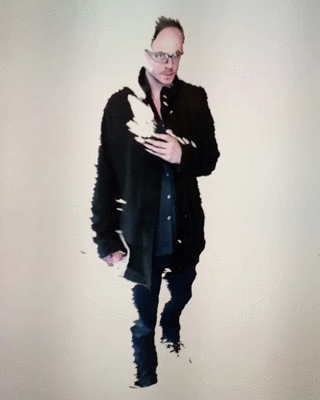 Né à Prague en 1978, André Ourednik s’est formé en Suisse dans les domaines de la géographie, de la philosophie et de l’informatique appliquée aux sciences humaines. Il s’intéresse aux espaces-temps humains, qu’il explore au moyen de recherches scientifiques, d’essais, de textes littéraires, de créations numériques, de performances, et d’installations interactives dans l’espace urbain, souvent en collaboration avec d’autres chercheurs et artistes.
Né à Prague en 1978, André Ourednik s’est formé en Suisse dans les domaines de la géographie, de la philosophie et de l’informatique appliquée aux sciences humaines. Il s’intéresse aux espaces-temps humains, qu’il explore au moyen de recherches scientifiques, d’essais, de textes littéraires, de créations numériques, de performances, et d’installations interactives dans l’espace urbain, souvent en collaboration avec d’autres chercheurs et artistes.
Auteur d’une thèse de doctorat portant sur l’articulation des modèles mathématiques et des approches phénoménologiques de l’espace habité, il est aujourd’hui écrivain, enseignant au Collège des Humanités de l’EPFL et à l’Université de Neuchâtel, et data scientist pour la Confédération helvétique.
Il mène une réflexion géographique autour de la civilisation des algorithmes et des données. Il a publié notamment le Wikitractatus (un poème hypertextuel, Hélice Hélas, 2014), Les cartes du boyard Kraïenski (roman, La Baconnière, 2015) et l'essai Robopoïèses: les intelligences artificielles de la nature (La Baconnière 2021). Son roman Omniscience (La Baconnière, 2017) dresse une satire métaphysique de la civilisation des données. En 2019, il a publié l’essai Hypertopie aux éditions de La Baconnière.
Born in Prague in 1978, André Ourednik studied in Switzerland in the fields of geography, philosophy and informatics applied to the humanities. He is interested in human space-time, which he explores through scientific research, essays, literary texts, digital creations, performances, and interactive installations in urban space, often in collaboration with other researchers and artists.
Author of a doctoral thesis on the articulation of mathematical models and phenomenological approaches to inhabited space, he is now a writer, lecturer at the College of Humanities at EPFL and at the University of Neuchâtel, and a data scientist for the Swiss Confederation.
He leads a geographical reflection around the civilization of algorithms and data. He has notably published the Wikitractatus (a hypertextual poem, Hélice Hélas, 2014), Les cartes du boyard Kraïenski (novel, La Baconnière, 2015) and the essay Robopoïèses: nature's artificial intelligences (La Baconnière 2021). His novel Omniscience (La Baconnière, 2017) draws a metaphysical satire on the civilization of data. In 2019, he published the essay Hypertopia with La Baconnière editions.